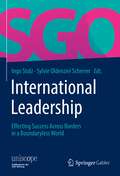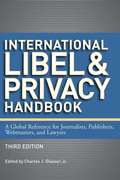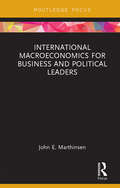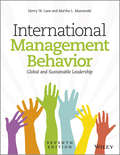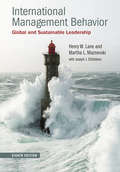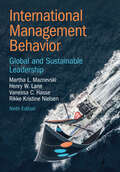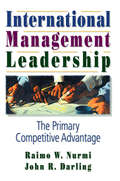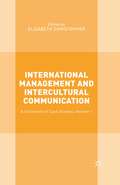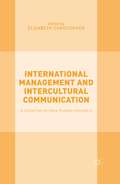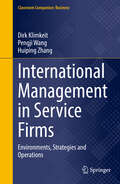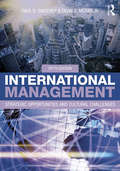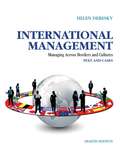- Table View
- List View
International Leadership: Effecting Success Across Borders in a Boundaryless World (uniscope. Publikationen der SGO Stiftung)
by Ingo Stolz Sylvie Oldenziel ScherrerThis edited volume strives to support leaders in successfully leading their teams, projects and organizations across borders in an increasingly boundaryless world. From both an academic’s and a practitioner’s perspective, the book focuses on international leaders and their potential to be or become enablers of international success, for and within their respective organizations. The authors are a curated selection of established experts, seasoned leaders, and new voices showcasing novel research, best practices, and business cases. The contributions are assigned to three sections, corresponding to the three core challenges of international leadership: Leading international organizations, leading international teams, and (self)leadership with intercultural excellence. An additional section is dedicated to case studies, exhibiting these challenges in practice.The Foundation of the Swiss Society for Organization and Management (SGO) as well as Innosuisse – Swiss Innovation Agency supported the creation of this book.
International Libel and Privacy Handbook
by Charles J. Glasser Jr.An indispensable survival guide for anyone in the media industry and the lawyers who serve them Especially now, in an age of instant global access through digital media, it is vitally important that journalists, authors and publishers, as well as the lawyers who serve them, be fully up on the laws governing media, worldwide. The ultimate resource for all the media content providers and purveyors, this fully updated and expanded Third Edition of the critically-acclaimed handbook offers you instant access to relevant libel and privacy laws and important legal rulings in the Europe, Asia, the Middle East and the Americas. It clearly and concisely explains risks publishers should know about prior to publication, steps they can take in order to avoid legal conflicts, and legal defences available to them in the event of a claim. Offers nation-by-nation summaries of libel and privacy law written by local practitioners in an easy-to-use reference format Expanded to include coverage of important emerging territories--Mexico, Israel, and Argentina, et al--as well as the latest libel and privacy rulings Features new chapters on emerging media markets--including Israel, Mexico, Argentina, Jordan, and others--as well as valuable updates to the Middle East section Provides updates on all major media markets and nations, along with coverage of changes in libel laws in key jurisdictions, including Australia, the UK, Hungary and Germany
International Liquidity and the Financial Crisis
by William A. AllenIn the ongoing financial crisis, policy makers have for the most part appeared to be reactive, formulating emergency solutions as events unfold. However, in contrast to their performance during the Great Depression, central banks around the world, led by the Federal Reserve, acted decisively following the collapse of Lehman Brothers and provided huge injections of liquidity into the financial markets, thereby preventing a far worse outcome. International Liquidity and the Financial Crisis compares the 2008 crisis with the disaster of 1931 and explores the similarities and differences. It considers the lasting effects of the crisis on international liquidity, the possibilities for an international lender of last resort, and the enlargement of the International Monetary Fund after the crisis. It shows that there is no clear demarcation between monetary and macro-prudential policies, and discusses how central banks need to adapt to a new environment in which global liquidity is much scarcer.
International Lobbying and The Dow Chemical Company (A)
by Arthur A. DaemmrichThis case explores company strategy, business-government relations, and collective action challenges associated with international and domestic lobbying regarding regulation of the chemical industry. In the fall of 2006, a five-year legislative process for a major new law regulating chemicals in the European Union appeared to be nearing its conclusion. REACH, the Registration, Evaluation, Authorization, and Restriction of Chemicals, would create a new European Chemicals Agency, require companies to submit testing data on existing and new compounds, and restrict the manufacture of hazardous substances. Andrew Liveris, CEO of the Dow Chemical Company, has to decide whether the company should engage in direct discussions with the European Parliament and Commission, with the implication that the company can influence the regulations but also would have to support the final outcome. The case summarizes Dow's history, competitive dynamics in the sector, and regulation of the chemical industry before describing the REACH legislative process and various approaches to lobbying used by chemical companies, trade groups, and environmental NGOs.
International Luxury Brand Strategy
by Pierre Xiao LuThis book looks at luxury brand management and strategy from theory to practice and presents new theoretical models and solutions for how to create and develop a worldwide luxury brand in the twenty-first century. The book gives an overview of how a luxury brand is created through the understanding and application of economic rules and through firms adopting new management models across multiple business dimensions. It also explains the application of theories and models and illustrates specific issues through case studies drawn from international markets such as China and France. The Chinese cases provide unique opportunities and insights into how these new luxury brands were created and how they have benefited from the international market over time. From the international brand management perspective, this book is a useful reference for anyone who wants to learn more about luxury brand management and to better understand how the international market has evolved and how products may change the rules of the game.
International Macroeconomics for Business and Political Leaders (Routledge Focus on Economics and Finance)
by John E. MarthinsenInternational Macroeconomics for Business and Political Leaders explains the fundamentals of international macroeconomics in a very efficient and approachable text. It explores key macro concepts such as growth, unemployment, inflation, interest, and exchange rates. Crucially, it also examines how these markets are interconnected so that readers will fully understand why economic, political, and social shocks to nations, such as the United States, China, Germany, Japan, and Brazil, must be evaluated in the context of all three macroeconomic markets: goods and services, credit, and foreign exchange. This book is as relevant and useful to individuals who have successfully taken and passed a Principles of Economics course, or more, as it is to those who have never taken any economics in high school or college but are motivated to understand the way international economies act and react. It uses an innovative approach to teach supply and demand principles, without using graphs, so as to be understandable and accessible to any interested reader or audience. This is not a theory-for-theory’s-sake textbook but a practice-oriented, common-sense approach to explaining international macroeconomics which quickly connects readers to real world events.
International Macroeconomics in the Wake of the Global Financial Crisis (Financial and Monetary Policy Studies #46)
by Daniela Marconi Laurent Ferrara Ignacio HernandoThis book collects selected articles addressing several currently debated issues in the field of international macroeconomics. They focus on the role of the central banks in the debate on how to come to terms with the long-term decline in productivity growth, insufficient aggregate demand, high economic uncertainty and growing inequalities following the global financial crisis. Central banks are of considerable importance in this debate since understanding the sluggishness of the recovery process as well as its implications for the natural interest rate are key to assessing output gaps and the monetary policy stance. The authors argue that a more dynamic domestic and external aggregate demand helps to raise the inflation rate, easing the constraint deriving from the zero lower bound and allowing monetary policy to depart from its current ultra-accommodative position. Beyond macroeconomic factors, the book also discusses a supportive financial environment as a precondition for the rebound of global economic activity, stressing that understanding capital flows is a prerequisite for economic-policy decisions.
International Macroeconomics: Theory and Policy
by Victor ArgyInternational Macroeconomics: Theory and Policy offers phenomenal coverage across the entire subject of international macroeconoimics in an open economy context. The book has four objectives: * to describe the evolution of and experiences with global exchange rate regimes * to introduce the reader to a rigorous analysis of open economy models * to apply the model framework to address key policy issues * to review individual country experiences of macro policy
International Management Behavior
by Lane Martha Maznevski Henry W. Joerg Deetz Joseph DistefanoNow in its sixth edition, International Management Behavior continues to help students develop the knowledge, perspective, and skills they need in order to conduct global business successfully. The combination of well-chosen, new and classic cases, as well as a completely revised text, provides excellent exposure to real-life management issues and a field-tested framework for understanding cross-cultural dynamics. Elimination of the readings has provided for greater flexibility and customization. For the sixth edition, the structure of the book has been totally revised and the text thoroughly updated to Reflect the authors' recent experiences. Material in the original chapters has been expanded and there are new chapters on managing change in global organizations and one on managing global teams and networks. The concept of the global mindset is used as the integrating theme that establishes a framework for the book making it applicable at both individual/team and organization levels. This book continues its tradition and orientation about managing people from different cultures and managing global organizations to get effective results. "This is much more than a new edition. It is a huge step forward. The strategy and culture chapters get in much closer to the small, focused details that make such a difference in implementation and that are so difficult to teach. Separating out personal integrity and corporate citizenship allows for a close examination of critical issues that are all too often glossed over. The expanded explanation of the MBI model works well. " Jeanne McNett, Assumption College
International Management Behavior: Global and Sustainable Leadership
by Henry W. Lane Martha L. MaznevskiThis is the seventh edition of International Management Behavior, an established text for students and executives developing the knowledge, perspective and skills required for leading and managing people in global business. This guide provides a comprehensive overview of international management, structured around the core challenges and opportunities faced by global managers. This encompasses: the role of the global manager, working on an individual and organizational level, and understanding how to manage a diverse workforce. Individual chapters address key subjects, including: the global mindset, working effectively across cultures, strategy execution, change management and working in global teams. This edition has been thoroughly updated to reflect recent developments in ethics and corporate sustainability. Based on over 40 years of teaching and research, International Management Behavior 7e is designed to stimulate and facilitate learning. This text combines a wealth of theoretical knowledge with current real-world examples across a range of cultures and industry sectors. The authors focus on research that provides the most immediate, practical guidance for managers, with well-chosen examples to demonstrate practical implementation and bring key concepts to life. To accompany the revised and updated seventh edition of International Management Behavior, updated instructor support material has been supplied at www.wiley.com/go/lane7e, including PowerPoint slides and teaching notes. This instructor site has been designed in conjunction with the main text to assist the teaching and development of global leaders.
International Management Behavior: Global and Sustainable Leadership
by Henry W. Lane Martha L. MaznevskiNow in its eighth edition, this is the textbook for current and future global leaders wanting to lead competently and sustainably in their business practices. Fully updated, the authors build on their forty years of teaching, researching and working with managers worldwide to bring students the latest developments in global business practice. Now including end-of-chapter reflection questions to guide topic comprehension, and directed further resources to assist individual research, this edition also sees the return of Ivey Business School and IMD cases in the book. This edition also includes a new conception of mindful global leadership as the integrating framework for execution of global strategy, highlighting the importance of a holistic approach to working across cultures and distance. Combining a wealth of theoretical knowledge with real-world examples from diverse cultures, countries and industry sectors, the practical guidance and well-chosen examples throughout the book bring key concepts to life.
International Management Behavior: Global and Sustainable Leadership
by Martha L. Maznevski Henry W. Lane Vanessa C. Hasse Rikke Kristine NielsenRigorously revised, the ninth edition of this successful, established textbook is ideal for current and future global leaders who want to lead international businesses sustainably and with impact. Combining a wealth of theoretical knowledge with real-world situations from diverse cultures, countries and industries, the book brings key concepts to life, while offering tools and strategies for putting them into practice. Reflecting global trends, this new edition features a greater focus on culture, virtual teams, leadership paradoxes, digital transformations, and a mindset-centered approach to dynamic change. All-new examples and cases contribute to bringing the book completely up to date, while reflection questions and a rich suite of online teaching resources (including suggested student exercises and classroom activities, teaching notes, further resources, and access to Aperian Globesmart), make this an essential tool for developing mindful, global leaders.
International Management Group (IMG)
by Bharat N. Anand Kate AtteaIn 2001, International Management Group (IMG) is the dominant company in the sports management industry. Its founder and CEO, Mark McCormack, is credited with having created the industry of sports management in the early 1960s. Over the next 40 years, IMG's expansion from athlete representation into other arenas--including representing models and classical music artists, producing and broadcasting television shows, operating training academies, corporate consulting, and financial planning--has been both dramatic and successful. This case describes the company's logic behind each expansion decision, as well as several challenges that the company has had to confront, specifically, maintaining the loyalty of the agents and clients, avoiding conflicts of interest with clients by virtue of the company's broad reach, deciding where to expand next, and meeting the challenge of increased competition from other sports management conglomerates.
International Management Leadership: The Primary Competitive Advantage
by Erdener Kaynak John R DarlingThe primary competitive advantage that firms have today is the perspective, outlook, and commitment of their management leaders. International Management Leadership helps you develop the leadership skills that will enable your firm to stay competitive in today's global business environment. From the necessary international perspective, this book provides you with the information you need to understand the competitive factors that distinguish one firm from another and to recognize the determinants of success.Giving you formats and outlines and a fresh perspective of your work, your organization, and yourself, International Management Leadership is much more practical than other management textbooks. You'll learn how to help make your company more effective in the arena of international management leadership as you read about:requirements of and special demands on international managersmanagerial leadership in the era of knowledgestrategic leadership and implementation of strategymanagement as a fulfillment of purposeleadership of conflict managementtransformational leadershipteam leadershipWhether you're an individual involved in a management training program, a management consultant, an executive manager, or a student of international management or business, you'll appreciate this book's take on the competitive factors of leadership in international business today. As a textbook, International Management Leadership provides students with a broad perspective on the practice of managerial leadership and organizational life in the global arena--bringing examples to life and going far beyond what is needed to simply pass a course.
International Management and Intercultural Communication: A Collection of Case Studies
by Elizabeth ChristopherInternational Management and Intercultural Communication.
International Management and Intercultural Communication: A Collection of Case Studies; Volume 1
by Elizabeth ChristopherInternational Management and Intercultural Communication consists of cases of direct observation and personal involvement in a wide variety of communication challenges in international management settings; and discusses them in terms of management theories. The cases explore interactions across national cultures and regional boundaries, demonstrating both traditional and unusual approaches to problems that sooner or later are likely to challenge all managers who operate internationally. The book is presented in two volumes. Volume 1 contains case studies concerning different aspects of international management and intercultural communication in business, marketing and politics. Volume 2 deals with cases of international management in social and educational settings.
International Management and Intercultural Communication: A Collection of Case Studies; Volume 2
by Elizabeth ChristopherInternational Management and Intercultural Communication consists of cases of direct observation and personal involvement in a wide variety of communication challenges in international management settings, and discusses them in terms of management theories. The cases explore interactions across national cultures and regional boundaries, demonstrating both traditional and unusual approaches to problems that sooner or later are likely to challenge all managers who operate internationally. The book is presented in two volumes. Volume 1 contains case studies concerning different aspects of international management and intercultural communication in business, marketing and politics. Volume 2 deals with cases of international management in social and educational settings.
International Management and International Relations: A Critical Perspective from Latin America (Routledge Studies in Management, Organizations and Society)
by Ana GuedesOver the last few decades, the field of management enlarged its boundaries, especially in international terms, in a very rapid fashion—mainly because of the arrival of the so-called era of globalization. Many renowned scholars have criticized the universal approach given to ‘management’ in the United States and its subsequent automatic conversion into ‘international management,’ but their arguments too can fall into the trap of universalism at times. This book has a more specific concern: to challenge the conversion of ‘management’ into ‘international management’ from a Latin American perspective. This challenge might be taken as a first step toward the construction of a Latin American perspective in International Management and a potential contribution to the development of this field in other parts of the world. Drawing upon such critical standpoint, several authors in the book converge upon the idea that researchers, practitioners and authorities in Latin America should challenge the US dominance in International Management and foster interdisciplinary developments within International Relations. The critical perspective provided in this book challenges the US’s narrow viewpoint on management as it clearly does not fit the governance features of ‘international management’ in Latin America. So far, we have not observed the constitution of sub-areas such as international management of international organizations, international management of transnational institutions, international management of public-private networks, international management of public companies, and international public administration or international public management, all of which would be extremely important in Latin America.
International Management and Language (Routledge Studies in International Business and the World Economy #Vol. 41)
by Susanne TietzeGlobalization processes have resulted in the emergence of business and management networks in which the sharing of knowledge is of crucial importance. Combining two contemporary and important subject areas – namely that of international management and also language and communication in multi-language contexts – the author of this book presents a wealth of ideas, examples and applications taken from international and global contexts, which show that ‘language matters’ in the pursuit of international business affairs. The book establishes the theoretical core of its main ideas by introducing two orientations (social construction and linguistic relativity) and demonstrates how they can be drawn on to frame and understand the activities of managers. Highly innovative and topical, Susanne Tietze’s book will appeal to students of international management and international human resource management as well as those studying intercultural communication. It is also useful for managers and practitioners who work internationally.
International Management in Service Firms: Environments, Strategies and Operations (Classroom Companion: Business)
by Dirk Klimkeit Pengji Wang Huiping ZhangThis textbook examines how service firms manage their international operations. For the first time, it brings together insights from the fragmented literature on this subject into an accessible textbook. Further, it is unique in its focus on service firms’ internationalization and international management. Beginning with an overview of the international environment in which service firms operate, it subsequently describes multinational service firms and their internationalization processes, strategies and organization. Unlike most texts on international services, the book goes beyond internationalization to address the ongoing management of service firms. It not only addresses functions such as global service marketing, financial management and human resource management, but also discusses aspects such as global account management, global service delivery and international project management, as well as the topical issue of managing distributed virtual teams. A dedicated chapter focuses on offshore shared services and business process outsourcing. These chapters are complemented by a discussion on international corporate governance and corporate social responsibility. The book is intended for students preparing for international careers in the service sector. Each chapter includes case studies, illustrations, highlighted definitions, a chapter summary and exercises.
International Management: Culture, Strategy, and Behavior (Ninth Edition)
by Fred Luthans Jonathan P. DohInternational Management: Culture, Strategy, and Behavior reflects new and emerging developments influencing international managers. With integrated real-world examples, research, and practical applications, students understand how to adjust, adapt, and navigate the changing global business landscape and respond to global challenges - making it a market - leader. The authors retain research and practices over the past decades, and incorporate new and emerging developments affecting international managers to increase students' effectiveness in managing across cultures.
International Management: Insights from Fiction and Practice
by Sheila M. PufferExploring topics covered in international management courses, this book pairs business articles and fictional short stories to provide practical guidelines and concrete examples and convey cultural subtleties and shades of meaning.
International Management: Managing Across Borders and Cultures, Text and Cases (Ninth Edition)
by Helen DereskyFor courses in international business, international management, and general management. International Business is conducted around the globe across cultures, languages, traditions, and a range of economic, political, and technological landscapes. International Management: Managing Across Borders and Cultures examines the challenges to the manager's role associated with adaptive leadership and thoroughly prepares readers for the complicated yet fascinating discipline of international and global management. No matter the size, companies operating overseas are faced with distinct scenarios. In order to be successful, they must accurately assess the components that shape their strategies, operations and overall function. The Ninth Edition trains readers and practicing managers for careers in this evolving global environment by exposing them to effective strategic, interpersonal, and organizational skills, while focusing on sustainability.
International Management: Strategic Opportunities and Cultural Challenges
by Dean B. Mcfarlin Paul D. SweeneyAs the economies of many countries become more interrelated, international managers are facing huge challenges and unique opportunities associated with their roles. Now in its fifth edition, Sweeney and McFarlin's International Management embodies a balanced and integrated approach to the subject, emphasizing the strategic opportunities available to firms on a global playing field, as well as exploring the challenges of managing an international workforce. Integrating theory and practice across all chapter topics, this book helps students to learn, grasp, and apply the underlying principles of successful international management: Understanding the broad context of international business, including the critical trends impacting international management, the legal and political forces driving international business, and the ethical and cultural dilemmas that can arise Mastering the essential elements of effective interaction in the international arena, from cross-cultural understanding and communication to cross-border negotiation Recognizing and taking advantage of strategic opportunities, such as entering and operating in foreign markets Building and leading effective international teams, including personal and behavioral motivation, as well as taking an international perspective on the hiring, training, and development of employees These principles are emphasized in the text with current examples and practical applications, establishing a foundation for students to apply their understanding in the current global business environment. With a companion website featuring an instructor's manual, powerpoint slides, and a testbank, International Management, 5e is a superb resource for instructors and students of international management.
International Management: Text and Cases (Eighth Edition)
by Helen DereskyThe eighth edition of International Management: Managing Across Borders and Cultures prepares students and practicing managers for careers in a dynamic global environment wherein they will be responsible for effective strategic, organizational, and interpersonal management. While managing within international and cross-cultural contexts has been the focus of this text since the first edition, the eighth edition portrays the burgeoning level, scope, and complexity of international business facing managers in the twenty-first century. The eighth edition explores how recent developments and trends within a hypercompetitive global arena present managers with challenging situations; it guides the reader as to what actions to take, and how to develop the skills necessary to design and implement global strategies, to conduct effective cross-national interactions, and to manage daily operations in foreign subsidiaries.
